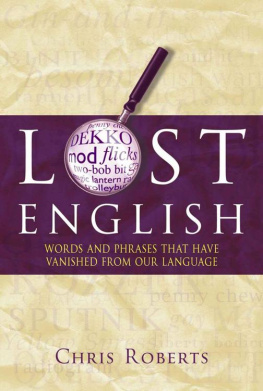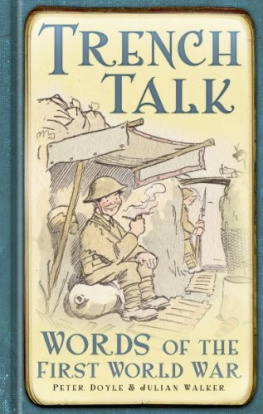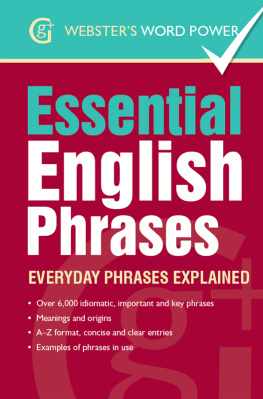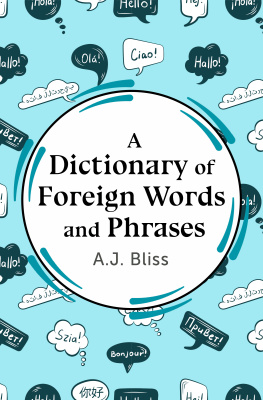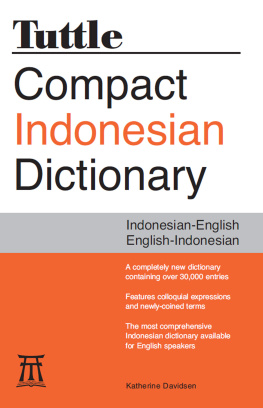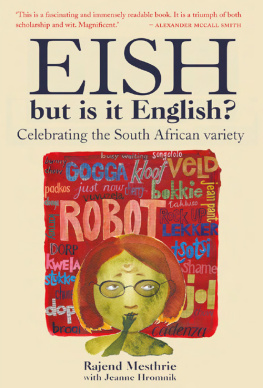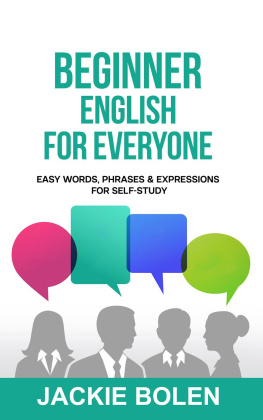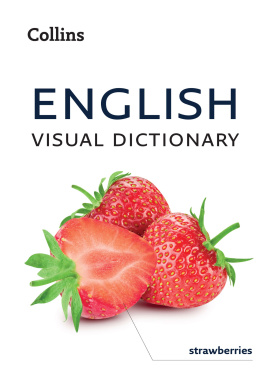LOST ENGLISH
By the same author:
Heavy Words Lightly Thrown: The reason behind the rhyme (2004)
Cross River Traffic: A history of Londons bridges (2009)

First published in Great Britain in 2009 by
Michael OMara Books Limited
9 Lion Yard
Tremadoc Road
London SW4 7NQ
This electronic edition published in 2012
ISBN: 978-1-843178255 in ePub format
ISBN: 978-1-843178248 in Mobipocket format
ISBN: 978-1-843172789 in hardback print format
Copyright Michael OMara Books Limited 2009
Every reasonable effort has been made to acknowledge all copyright holders. Any errors or omissions that may have occurred are inadvertent, and anyone with any copyright queries is invited to write to the publishers, so that a full acknowledgement may be included in subsequent editions of this work.
All rights reserved. You may not copy, store, distribute, transmit, reproduce or otherwise make available this publication (or any part of it) in any form, or by any means (electronic, digital, optical, mechanical, photocopying, recording or otherwise), without the prior written permission of the publisher. Any person who does any unauthorized act in relation to this publication may be liable to criminal prosecution and civil claims for damages.
A CIP catalogue record for this book is available from the British Library.
Cover design by www.blacksheep-uk.com
Designed and typset by David Sinden
www.mombooks.com
To everyone who helped, which is pretty much everyone so thanks.
CONTENTS
I NTRODUCTION
English has the largest vocabulary of any language in the world. This may be because English has a magpie-like tendency to adopt words from pretty much anywhere as well as having been shaped by successive waves of invaders, bringing with them Danish, Anglo-Saxon and French words. Lost English reveals how some of those words have evolved and how others betray where the English themselves have invaded, or traded. The need for administrators in the far-flung corners of the British Empire meant that many Indian and Asian terms eventually made their way back home (ayah, dekko, mufti and veranda, qq.v., amongst others) and were absorbed into mainstream English. Similarly, trade links with China, the Middle East and Africa brought with them not only British prosperity, but a richer and more vibrant language, with words such as baksheesh (q.v.).
However, as new words and phrases come into the language, so others fall into disuse. Over the past thirty years there seems to have been quite a cull as Britain has reassessed its relationship with the rest of the world, and in particular the countries of the former British Empire. This, and the demilitarization of British society with the end of National Service in the 1960s, left a slew of terms adrift in the language whose use has dwindled and all but disappeared. A shame in many ways, as life must have been made richer when people referred to poodlefakers, rum coves and knickerbockers.
Many of the words and concepts in this book will be distantly familiar to the reader, who may even use them in conversation from time to time either ironically or deliberately to invoke a rather archaic tone. However, they are no longer part of everyday language, even though they may have been common until well into the last half of the twentieth century. Some are, as mentioned above, the victims of huge socio-economic events, whilst others lost out to changing fashion, social attitudes and new technologies.
In the latter case, the words are doomed to extinction because, quite simply, the objects and practices they describe have become obsolete. Other lost words occasionally make a comeback and one of the dangers of writing a book like this is that one is setting oneself up for a fall. A hundred and fifty years ago the word crap (meaning husk or waste product) would certainly have been included in a nineteenth-century version as no one in England used it any more. However, the confluence of two unrelated events that affected the lives (directly or indirectly) of everyone in Britain brought this word back in the early twentieth century.
In the early part of Queen Victorias reign Mr Thomas Crapper perfected his flushing toilet at his workshop in Chelsea. He adopted the slogan a certain flush with every pull and his lavatories sold across Britain. No one thought there was anything risible about this until the First World War, when American troops came over to the UK in their thousands. In the US the word crap was not obsolete and was used pretty much in its modern sense. Naturally the GIs thought it was hilarious, yet curiously logical, that they could take a crap in a crapper. So, in what etymologists refer to as a backwards formation, Crapper was reunited with crap in the speech of his countryfolk, and the word reappeared in Britain. Its widespread social acceptability is also an example of more recent changing attitudes to swearing. This has meant a drop-off in the use of muted oaths such as What the dickens! (q.v.) and By Jove! in favour of older and more robust Anglo-Saxon alternatives.
We live in an age with unparalleled access to information and easy storage and dissemination of that knowledge. We also live at a time of incredibly rapid change and this is reflected in the turnover of words as well, particularly as technologies move on and social structures shift. The latter in particular has resulted in words like character (in the sense of a reference), beano and brownie (qq.v.) which, while never quite falling out of use, have seen their primary associations shift. Even relatively newly minted words and phrases can quickly become archaic or mutate to survive, as the examples of video and yuppie highlight. Despite the fact that it is hard to buy a video player and that the tapes have been replaced by DVDs (a technology unlikely to survive half the time that videos did), bands still release promotional videos, while films downloaded from the Internet are still referred to as videos. Yuppies, on the other hand, have vanished linguistically.
Yuppies were, if not exactly a new class, certainly indicative of many of the changes brought about since the 1980s in such things as financial security and, well, lifestyle (a word that has really come into its own this century). This before mentioning their key impact on the workforce and economy which has been transformed, whether one regards this as good or bad, over the past generation or so by yuppie values, and by politicians who shared those values. Politicians have, however, had a much more profound impact on spoken English in other areas, most notably with regard to what is usually referred to as incitement or inflammatory speeches. Nobody mourns the casually wounding terms used about sexual or ethnic minorities that were prevalent until quite recently, but equally the restricting of reasonable debate for fear of giving offence is an increasing worry to many sensible people, as well as to reactionary parrots in the yellow press (q.v.).
Its odd that the phrase yellow press (like the word reactionary, for that matter) has fallen from use, as we live in a golden age of exactly that. This is not the place for a discussion about the impact of mass media on contemporary culture vis--vis previous eras, except to say that how we speak and the words we use are changing more rapidly due to the sheer amount of (often conflicting) media sources in our lives.
They could just be hastening the evolution of language, which has been tracked back almost 30,000 years by scientists at Reading University. These researchers (using a high-powered computer known as ThamesBlue) discovered that identity words like I and we, along with numbers and basic questions such as why? are among the oldest. They also claim to be able to predict which are likely to disappear soon, including such seemingly safe ones as dirty, guts and squeeze. Apparently it is all down to which take the longest to evolve, usually numerals followed by nouns. After these come verbs and adjectives, with conjunctions and prepositions developing fastest of all.
Next page
